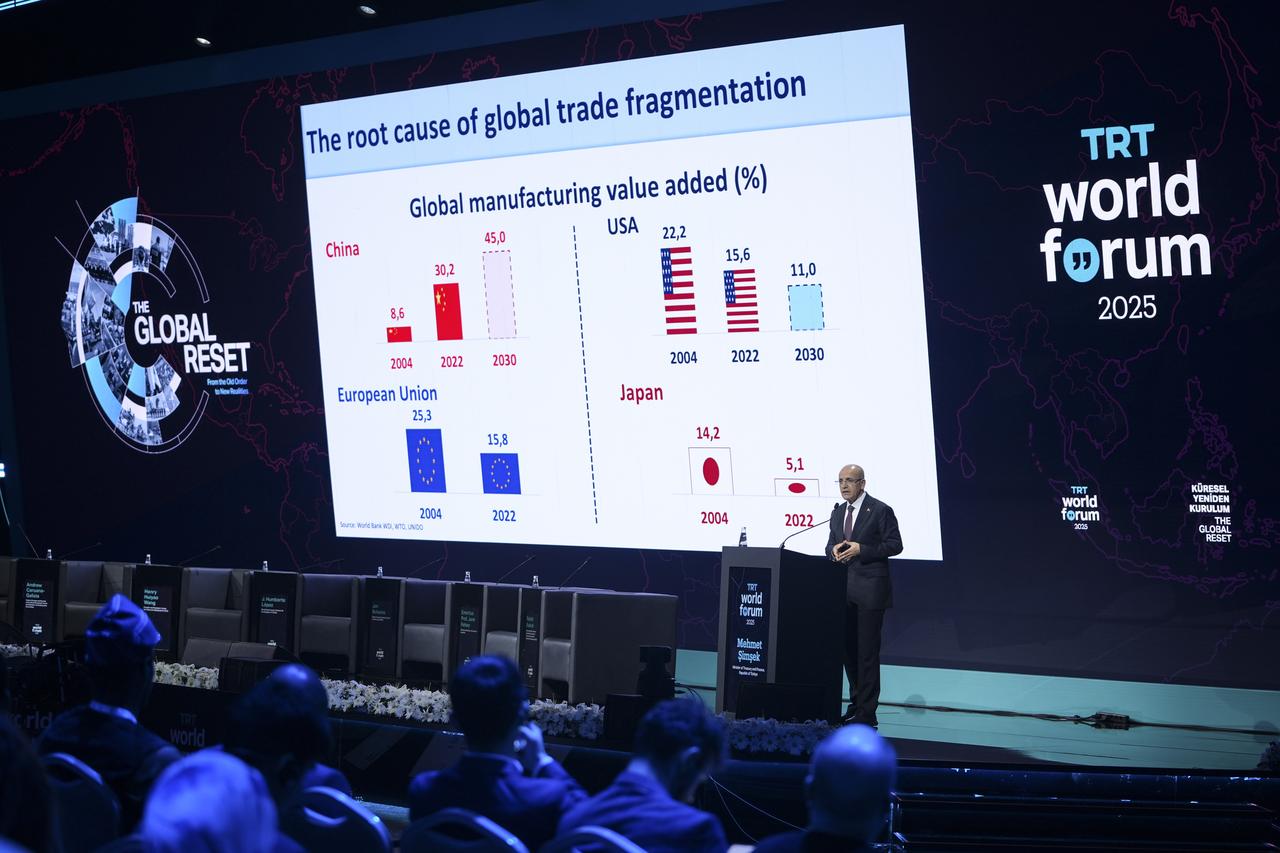
Finance Minister Mehmet Simsek said Türkiye is once again on the path to becoming a regional hub for direct investment and aims to return to investment-grade levels through further credit-rating upgrades.
Speaking at the TRT World Forum 2025 in Istanbul, Simsek said the share of high- and medium-technology products in Türkiye’s exports has increased, adding: “Direct investments have increased nearly 20-fold in the last 20–25 years. We aim to return to investment-grade levels with further credit rating upgrades. Over the last 20 years, average real growth has been 5.4%."
"This reflects the economic performance under our President Recep Tayyip Erdogan. Compared to developing countries, especially when China and India are excluded, Türkiye’s growth performance is clearly ahead," Simsek stated.
Simsek said global uncertainty is at an unprecedented level, but market sentiment remains positive due to the resilience of the global economy.
He noted global growth rates in recent years have been lower than in previous periods and pointed to several global challenges, including protectionism in trade, high indebtedness, aging populations, the disruptive effects of artificial intelligence, climate change, and geopolitical tensions.

He highlighted that protectionism has become the new normal in global trade and is likely to remain permanent, despite periodic easing between major economies such as China and the United States.
Citing China’s growing dominance in global manufacturing, Simsek said China’s share has risen from below 9% to more than 30% in the last two decades, noting:“The U.S. share in global manufacturing fell from 22% to 11%. The European Union lost nearly 10 points. Japan as well. This is the main reason for protectionism.”
Simsek said China has become the number-one trade partner for many more countries over the past 20–25 years and that rising real wages in developing countries, compared with stagnation in developed economies, have fueled social and political backlash against globalization and the rules-based trade system.
He said that losing manufacturing capacity also means losing related service sectors, reinforcing long-term protectionist trends.
He stressed that Türkiye is relatively less vulnerable to this environment, saying 62% of Turkish exports go to countries with which Türkiye has free trade agreements, while more than 80% go to nearby regions, including Central Asia, the Middle East, and North Africa.
“This partially protects us,” he said, adding that Türkiye’s strong services exports also provide support.
“If global fragmentation continues, we can focus on regional integration. We see regional integration as an antidote to global fragmentation,” he said, noting efforts to deepen regional economic ties, upgrade agreements with the U.K. and EU, and pursue new trade pacts with Gulf states.
Simsek highlighted the Development Road Project linking Iraq’s Faw Port to Europe via Türkiye, saying it will provide uninterrupted land and rail connectivity and strengthen supply chain resilience.
He said Türkiye’s low debt-to-gross domestic product (GDP) ratio—89% compared with a global average of 324%—allows more capacity for spending on infrastructure, education, and health.
“We are using this space for structural reforms, investments to increase productivity, artificial intelligence, and the green transition,” he said.
Simsek said Türkiye benefits from a demographic window of opportunity and is working to raise female employment.
He added that the global “silver economy” is expected to grow from $5.5 trillion to $8.5 trillion, and Türkiye could become a hub for elderly care and health services.
He also pointed to Türkiye’s advances in artificial intelligence, 5G, defense industries, and renewable energy, noting that Türkiye ranks among the top 10 countries in production potential for solar, wind and geothermal equipment.
Discussing the disinflation program, Simsek said, “We aim to ensure price stability, strengthen fiscal discipline, and reduce the current account deficit."
"There has been significant progress in this area. Structural transformation is the key element for sustainability. We are in the second phase of the program, and progress is notable. We aim to bring inflation back to single digits.”